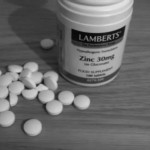 Zinc is an essential trace mineral in human nutrition that is required as a cofactor in a number of metalloenzymes. Its divergent functions include roles in oxidoreductase, hydrolase, lyase, isomerase, transferase and ligase metalloenzymes. Zinc is also used in gene expression, cell replication, membrane and cytoskeletal stabilisation and in the structure of hormones. Evidence from the nutritional literature suggest that zinc deficiencies may be widespread (here). This may relate to low intakes of minerals in Western foods resulting from the high nutrient losses during the milling of cereal grains (here) and the low zinc content of some soils. However, zinc is also provided in the diet through consumption of meat and so other factors may explain the low plasma zinc status of some individuals. A number of dietary factors are known to influence zinc absorption including phytate, oxalate, polyphenols, fibre and divalent cations such as copper (Cu2+), iron (Fe2+) and calcium (Ca2+). Interference with zinc absorption has also been reported to occur in the presence of folate.
Zinc is an essential trace mineral in human nutrition that is required as a cofactor in a number of metalloenzymes. Its divergent functions include roles in oxidoreductase, hydrolase, lyase, isomerase, transferase and ligase metalloenzymes. Zinc is also used in gene expression, cell replication, membrane and cytoskeletal stabilisation and in the structure of hormones. Evidence from the nutritional literature suggest that zinc deficiencies may be widespread (here). This may relate to low intakes of minerals in Western foods resulting from the high nutrient losses during the milling of cereal grains (here) and the low zinc content of some soils. However, zinc is also provided in the diet through consumption of meat and so other factors may explain the low plasma zinc status of some individuals. A number of dietary factors are known to influence zinc absorption including phytate, oxalate, polyphenols, fibre and divalent cations such as copper (Cu2+), iron (Fe2+) and calcium (Ca2+). Interference with zinc absorption has also been reported to occur in the presence of folate.
The interaction between folic acid and zinc has been known for some time because patients with megaloblastic anaemia secondary to folate deficiency have elevated plasma levels of zinc. These zinc levels return to normal on administration of folic acid. The mechanisms of the interaction between folate and zinc have been reported in the literature, with particular emphasis on animal experiments. For example, in one study1 a series of in vivo and in vitro experiments were performed to identify the possible mechanisms by which folate can diminish zinc absorption. The Presence of folate in the lumen of the jejunum of rats significantly inhibited the luminal to mucosal flux of zinc and decreased the mucosal concentration of zinc. This suggests that the site of inhibition of folate on zinc absorption is the lumen of the gastrointestinal tract. Therefore the interaction between zinc and folate might result from the forming of insoluble complexes that inhibit the absorption of both nutrients by increasing excretion.
The ability of nutrients to form insoluble complexes is not unusual. In fact calcium is known to form soaps with fatty acids that may inhibit the absorption of dietary fats in humans. This may explain the ability of calcium to cause weight loss in humans. To investigate the ability of folate to form insoluble complexes with zinc, the same researchers tested various concentrations of zinc and folate using in vitro experiment with charcoal to measure the degree of complexation. The data suggested that zinc forms insoluble complexes with folic acid at a pH of around 2. However, at a pH of around 6, the complexes did not form. This suggests that zinc may form complexes in the stomach acid with folate, but that these complexes may dissolve at the higher pH of the duodenum. Therefore under normal physiological conditions of the small intestine, zinc and folate do not form insoluble complexes, suggesting that the level of interaction may be transportational at the gut luminal surface itself. Zinc therefore also likely inhibits folate absorption.
